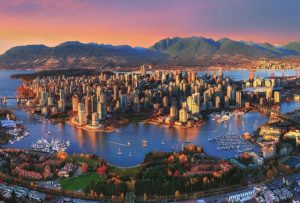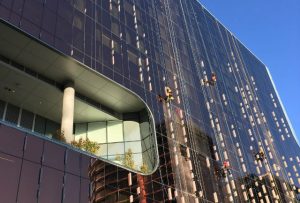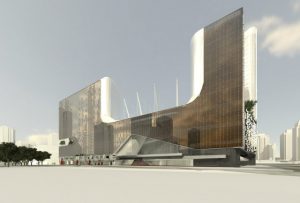 Parq Vancouver, the new jewel of the Vancouver skyline, opened doors on September 29 to great interest, particularly in the late hours when a formidable lineup of players was formed in front of the complex’s 72,000-square-foot casino.
Parq Vancouver, the new jewel of the Vancouver skyline, opened doors on September 29 to great interest, particularly in the late hours when a formidable lineup of players was formed in front of the complex’s 72,000-square-foot casino.
Describing the C$600-plus-million multi-purpose resort as a jewel is not just a trope used for the sake of poeticism. The copper glass U-shaped building of Parq Vancouver is indeed an appealing addition to the skyline of the bustling Canadian city.
The idea about the destination resort, billed as the largest-ever private development in the British Columbia province, was conceived back in 2006, when developer Paragon Gaming purchased the struggling Edgewater Casino, located in downtown Vancouver. The Las Vegas-based gambling company paid the amount of C$43 million to save the property, which was losing around C$9 million every six months, from bankruptcy. Given its poor financial performance, the facility could not escape closure, but its new owner’s ambitions to run a gambling business in Vancouver did not die.
It took several years before Paragon first revealed plans to develop a parcel of land in the central part of the city and relocate Edgewater Casino’s existing license to that new development. That announcement eventually occurred around the 2010 Winter Olympics which Vancouver hosted.
As it can be seen, the project took seven years to be materialized. It was welcomed by many and opposed by others. In fact, the Vancouver City Council rejected Paragon’s original plan for a gambling resort in the heart of the city and the developer had to reduce the scope of the gambling portion of its scheme before submitting its revised proposal, which was eventually approved. That initial rejection was one of the reasons for the delay in Parq Vancouver’s realization.
While developments like Paragon’s resort are usually considered beneficial for the tourism industry of their host region, the casino portion of such plans is often faces controversy and the case was not different with Parq Vancouver.
How will Vancouver benefit from the project? What risks does it pose to the local community? And what does the Parq Vancouver scheme actually involve? We will try to answer these questions in as comprehensive manner as possible.
Parq Vancouver in Detail
 As mentioned above, the original idea about the multi-purpose gambling resort was first introduced to city officials and residents as well as to British Columbia gambling regulators in 2010. Paragon co-founder Scott Menke was the mastermind behind the multi-million-dollar plan. His proposal for a new development in the city’s center included relocation of Edgewater Casino and expansion of its existing operations.
As mentioned above, the original idea about the multi-purpose gambling resort was first introduced to city officials and residents as well as to British Columbia gambling regulators in 2010. Paragon co-founder Scott Menke was the mastermind behind the multi-million-dollar plan. His proposal for a new development in the city’s center included relocation of Edgewater Casino and expansion of its existing operations.
The now-closed gambling venue featured 600 slot machines and 75 gaming tables. Mr. Menke hoped that his company would be allowed to extend the number of gaming options available to 1,500 slot machines and 150 gaming tables. The relocation part of the proposal was approved by city councilors, but the planned expansion was blocked.
In 2013, Paragon entered into agreement with B.C. Pavilion Corp., the operator of BC Place Stadium, to develop a nearby 2-acre plot into a multi-purpose integrated resort with casino and a number of other amenities. That deal and eventual approval from the city council made it possible for Paragon to finally start work on what would be launched as Parq Vancouver.
Construction of the property began in the summer of 2015 and it was initially announced that the resort would open doors in late 2016. However, the opening was postponed due to unspecified construction-related reasons. As mentioned above, Parq Vancouver held its ribbon-cutting ceremony in late September.
The complex has two Marriott hotels – the JW Marriott and The Douglas, named after David Douglas, the famous Canadian botanist who is known to be the namesake of the Douglas Fir. JW Marriott features 329 hotel rooms, 44 suites, 3 luxury suites, and a two-floor villa. As for The Douglas, it has 178 rooms and 10 suites.
Parq Vancouver also offers visitors eight restaurants with international cuisine, more than 60,000 square feet of conference space, a 30,000-square-foot park located six floors above the street and planted with native trees, a modern fitness and spa studio, and a number of other different amenities.
The gaming portion of the resort occupies 72,000 square feet and two floors. The first floor of the casino is where mass market gambling options can be found, while the second floor features private gaming salons. It is important to note that the private gaming options and the overall luxuriousness of the resort are intended to attract foreign customers, particularly ones from the Asia-Pacific region who are well-known for their gambling habits.
As already mentioned, Parq Vancouver’s casino was originally planned to feature two times more gambling options, but the developer’s proposal was blocked by city officials. Eventually, Paragon was allowed to relocate Edgewater Casino to its new resort but to retain the number of gambling options the venue had offered prior to its closure.
Expected Benefits from the New Casino Resort
 Parq Vancouver has been touted as the city’s largest private investment. With its two-story casino, open 24 hours a day, and bookened by its two luxury hotels and other amenities, the C$600-plus-million resort is expected to help Vancouver mend shortage of downtown hotel rooms and provide both residents and guests with late-night entertainment.
Parq Vancouver has been touted as the city’s largest private investment. With its two-story casino, open 24 hours a day, and bookened by its two luxury hotels and other amenities, the C$600-plus-million resort is expected to help Vancouver mend shortage of downtown hotel rooms and provide both residents and guests with late-night entertainment.
Developers have promised to bring businesses to Vancouver that had never before considered establishing themselves in the city or even in Canada.
As previously pointed out, the luxury facilities at the resort and and particularly its VIP gambling offering will certainly lure wealthy big spenders to the city’s downtown. And while Paragon has tried to divert focus from gambling with the introduction of multiple other entertainment and foot and beverage facilities in a bid to win the city council’s favor, it is more than clear that its gaming floor will produce a big share of the resort’s total revenue.
Speaking of revenue, the gambling resort is expected to generate millions of dollars every year by attracting wealthy offshore tourists and casino patrons, and to contribute a significant amount of money in tax revenue to the city.
The creation of new jobs was pointed as another important benefit from the recent opening of Parq Vancouver. Paragon said at the property’s opening ceremony that around 2,000 workers were employed temporarily during the resort’s construction. Now operational, the resort is expected to employ between 1,800 and 2,000 people.
Parq Vancouver is clearly an important project. However, despite the millions of dollars invested in its construction and contributed to the city, and the millions more expected to be contributed to the city in the years to come, the resort has been accompanied by controversy since the inception of Paragon’s idea for it.
Why Did Paragon’s Project Face Staunch Opposition?
 The original proposal for the construction of an integrated resort in downtown Vancouver was welcomed by British Columbia authorities, but city officials were much less enthusiastic about what Paragon was offering.
The original proposal for the construction of an integrated resort in downtown Vancouver was welcomed by British Columbia authorities, but city officials were much less enthusiastic about what Paragon was offering.
The gambling operator wanted to expand gambling in the city and apparently did little consultation with the host community and the city council before submitting its application. Citizens and the Vancouver Not Vegas anti-gambling organization mounted opposition that eventually resulted in the project’s rejection.
In 2011, city councilors voted against the plan, citing concerns over increased gambling, increased crime, and other social ills that could be triggered from the opening of a larger gambling venue at the heart of the city. We will not once again that only the expansion portion of the plan was quashed.
City councilors pointed out back then that the potential harm expanded gambling could inflict on Vancouver citizens outweighed the benefits of the creation of new jobs and additional tax revenue.
The project was also contested by many due to the fact that it was namely Paragon that wanted to carry it out. Important Vancouver figures claimed that the developer was actually a low-rent company that tended to build unstable gambling venues on native land across the United States and the Alberta province. An Alberta-based casino, owned by Paragon, went bankrupt not long before debates over the Vancouver project took place and another gambling venue was sold in what was described by opponents as “a cloud of controversy”.
Another instance of controversy surrounding the multi-million-dollar scheme was the appointment of former British Columbia Lottery Corporation CEO Mike Graydon as Head of Parq Vancouver’s Hospitality division. Mr. Graydon assumed his new post in February 2014 only several days after he left the British Columbia gambling regulator. However, it was found that he had been in conflict of interest during his final two months at the Lottery Corporation when he had negotiated his new job. Mr. Graydon eventually left his post at Parq Vancouver saying that his experience did not match his position at the resort.
Conclusion
Parq Vancouver is an ambitious project that, if managed properly and responsibly, will certainly have positive impact on Vancouver and British Columbia’s tourism industry as well as other related industries. Examples from other parts of the world have shown that multi-purpose resorts of this kind are popular with various groups of customers due to the diversity of services available.
It is yet to be seen whether Paragon will be able to maintain its new resort’s popularity and whether it will be able to accomplish its goal of enhancing Vancouver’s gaming and entertainment scene. Hopes are that Parq Vancouver will not face the fate that befell some of Paragon’s other projects.



















